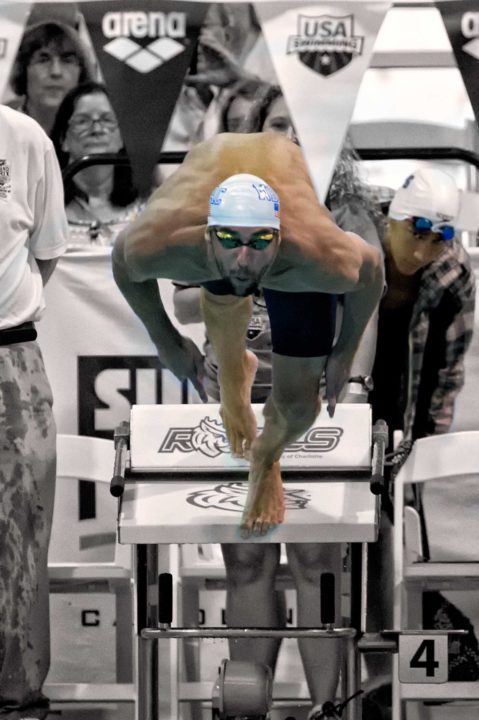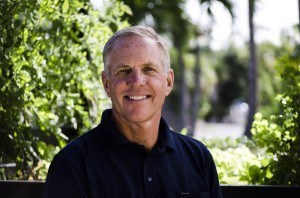Courtesy of Gary Hall Sr., 10-time World Record Holder, 3-time Olympian, 1976 Olympic Games US Flagbearer and The Race Club co-founder.
This is part two of a five part series, part one can be found here.
Part II Coupling Motions: The Head
With either type of track start, there are three important coupling motions that will augment the forces of the swimmer leaving the block and result in a better dive. A coupling motion is a movement of some part of the swimmer’s body that produces no propulsive force by itself, yet increases the forces that create propulsion. The three coupling motions are the head lifting up, the arm motion and the back leg lift for fast swimming starts.
The adult head weighs approximately 12 pounds, so if one moves it around quickly, it can create quite a bit of energy. In martial arts, students learn to use their head as a weapon. It can also become a weapon for the start, if used properly.
The energy that the head provides on the start is related to the square of the speed at which it is lifted. If a swimmer takes his mark with the head extended forward, there is little room to further lift it and less kinetic energy that can be attained from its motion. Further, in the extended position, the swimmer is less relaxed, as the neck muscles are working to maintain that position.
Head Motion
At the sound of the starter’s beep, the head should be in the neutral position (looking down) and snapped upward to full extension as quickly as possible simultaneously with the push off of the block with the feet. This motion also helps project the swimmer forward. If the head is held in the neutral or down position, not only does the swimmer lose out on the coupling motion of the head lift, but he also tends to go downward toward the water, rather than forward.
Of course, once the head is fully extended, it must be immediately fully flexed back down, so that the chin is touching the chest, enabling the arms to get into the streamline position behind the head. With practice, there is enough time on the dive to lift the head fully, and then press the chin back down to the chest, prior to entering the water. How much are you using your head to add to your propulsion on your start?
Yours in Swimming,
Gary Sr.
Like The Race Club on Facebook
Follow The Race Club on Instagram
Follow The Race Club on Twitter
Connect to The Race Club / Gary Hall Sr. on Linkedin
THE RACE CLUB
Because Life is Worth Swimming, our mission is to promote swimming through sport, lifelong enjoyment, and good health benefits. Our objective is for each member of and each participant in The Race Club to improve his or her swimming performances, health, and self-esteem through our educational programs, services and creativity. We strive to help each member of The Race Club overcome challenges and reach his or her individual life goals.
creativity. We strive to help each member of The Race Club overcome challenges and reach his or her individual life goals.
The Race Club provides facilities, coaching, training, technical instruction, video, fitness and health programs for swimmers of all ages and abilities. Race Club swim camps are designed and tailored to satisfy each swimmer’s needs, whether one is trying to reach the Olympic Games or simply improve one’s fitness. Our programs are suitable for beginner swimmers, pleasure swimmers, fitness swimmers, USA swimming or YMCA swimmers, or triathletes; anyone who wants to improve swimming skills. All of our Race Club members share an enjoyment of being in the water and use swimming to stimulate a more active mind and body.


On the guys side, there are three starts that are insane to the 15 m mark: Manaudou, Dressel, and especially Tandy. Each one does it a different way.
Those 3 starts are probably the fastest in the world right now
Actually, Tandy’s and Dressel’s starts are similar, both weight back starts. Tandy uses a straight arm recovery and higher and Dressel bends the arms slightly, but both get a tremendous amount of coupling energy from head, arms and back leg. Manaudou, on the other hand, is weight forward and most of the success of his dive is based on his incredible underwater speed. He also has a bigger body than most of them and that extra mass helps his momentum on the entry, so long as he gets in cleanly, which he does.
A good way to remember this cue position is to look for your entry target as quickly as possible after the sound of the gun. As soon as the target is found visually, immediately drop the chin and enter the water.
What are your thoughts on Adam Peaty’s new start? For once he wasn’t left behind on the start, yet his head was fully extended forward.
What matters is the 15m mark. He still gets beaten in the underwater part of the dive by Van der Burgh and many others. Which means his start is either poor or the underwater is not the best.
I agree. Adam may be better weight forward and head up than he was before, but that doesn’t mean he is good on the start. He still comes up well behind most of the others (yet catches them in about 3 strokes!) The best starters not only have great leaping ability but also use physics (coupling motions and low frontal drag) to their advantage.
He has more of a forward weight than he used to. Almost to the point of the old Japanese start from the 80’s (I think) where the guy grabbed the sides of the block and leaned forward. Faster reaction time off the blocks, less overall power to 15 m.
I’d say it’s entirely based on the athlete. Many are not fully master the forward start technique while others, such as Florent Manaudou, have executed with great success. Overall power and athleticism have a big role to play in it as well is mentally being able to adjust to having your head and body so far forward. To each his/her own. Caeleb Dressel does a completely different start by almost curling into a ball and shooting himself forward and has had tremendous success with it, as well.
That second sentence was a grammatical travesty. What I meant to say was that many athletes have not fully mastered the forward start technique while others have had great success.
It would appear to be so, although some technical things, like Tandy’s flying mongoose start, maybe should be emulated more.